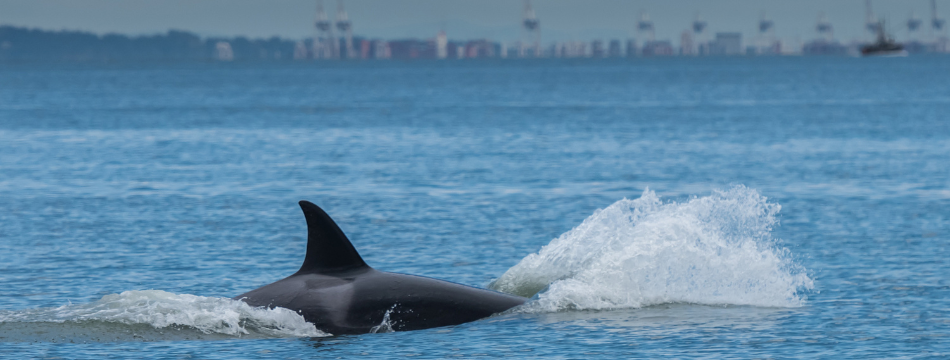A court victory would demonstrate that laws protecting endangered species cannot be disregarded in the name of megaprojects.
Conservation groups are at Vancouver Federal Court today fighting to uphold laws aimed at protecting endangered species by challenging the approval of the Roberts Bank Terminal 2 project by way of a judicial review.
Represented by Ecojustice lawyers, the David Suzuki Foundation, Georgia Strait Alliance, Raincoast Conservation Foundation and the Wilderness Committee will argue that approval of this megaport is unlawful, as the project cannot be deemed “justified” under environmental assessment legislation when it contradicts another statute—the Species at Risk Act.
The Port of Vancouver is set to destroy 177 hectares of important Chinook habitat in the heart of the Fraser River estuary to make way for this expansion, which will double the capacity of the existing terminal. The Fraser River estuary is one of Canada’s most biodiverse regions, with habitat for more than 100 species already at-risk, including 14 populations of Fraser Chinook and the Southern Resident killer whales (SRKW) that feed on them. Construction and operation of this port will intensify stress on the estuary, further endanger some of the largest wild salmon runs in the world and increase the risk of extinction for these orcas.
With only 74 Southern Residents left and an emergency order request recently filed by conservation groups, these killer whales cannot withstand any further loss and destruction of their critical habitat. A recent analysis found that survival for these endangered whales requires habitat conditions to improve, not get worse.
For the past decade, conservation organizations, scientists and local community groups have urged the federal government not to approve the Terminal 2 project. Today, supporters rallied outside of the courthouse to highlight the negative effects of the project, including considerations for labour and First Nation communities.
A court victory would demonstrate that laws protecting Canada’s endangered species cannot be disregarded in the name of megaprojects that jeopardize their survival. If the Species at Risk Act is to protect the species that need it, the Roberts Bank Terminal 2 project cannot proceed.
Margot Venton, Director, Nature Program, Ecojustice –
“Our federal Species at Risk Act, reflects Canada’s commitment to the world to halt and reverse the biodiversity crisis through the protection of species at risk, like the Southern Resident killer whales. In this case, we are asking the Court whether the government can lawfully sidestep the Species at Risk Act when approving major projects. This question is important for the protection of species at risk throughout Canada.”
Jeffery Young, senior science and policy analyst with the David Suzuki Foundation, said:
“Southern resident killer whales are already on the brink, struggling with noise and vessel pollution, contaminants and a decline of Chinook salmon. Now, they’re facing noisier, riskier waters from a newly operational Trans Mountain pipeline expansion. The last thing they need is a megaport that will cause irreversible harm to them and their prey.”
Lucero Gonzalez, Conservation and Policy Campaigner with the Wilderness Committee, said:
“The federal government must uphold its own Species at Risk Act. We should not be going to court for this! The public should be able to trust that laws meant to protect species at risk and our shared environment will be respected and that projects will not be approved unless they are in line with those laws. We can’t afford the vast scale of devastation this project will cause, from driving southern resident killer whales closer to extinction to disrupting thousands of family-supporting jobs. This project simply cannot go ahead.”
Russ Elliott, Campaigns Manager at Georgia Strait Alliance, said:
“The government can — and must — do more to safeguard the biodiversity of these lands and waters that they have pledged to protect, including the Southern Resident killer whale. The Roberts Bank Terminal 2 Project (RBT2) poses a great threat to these orcas that are so close to extinction, and yet are so intimately known to us. We know their names, their personalities, their families. The cumulative impact of RBT2 and other mega-projects intensifies threats from climate change and pollution, jeopardizing the survival of species listed under the Species at Risk Act—our government’s own legislation! How many orcas must die before protecting life takes precedence over economic gain? The precious life of these 74 orcas hangs in the balance.
Kristen Walters, Director of Salmon Habitat & Climate Change at Raincoast Conservation Foundation –
“When the federal government approved the Roberts Bank Terminal 2 Project, they contravened their own legislation, the Species at Risk Act. We argue that this approval is unlawful, and as such, it cannot move forward. We will continue to champion a thriving Fraser River Estuary that supports the recovery of endangered Southern Resident killer whales and over 100 other at-risk species. This is a place worth fighting for, one that whales, fish, birds and people have depended on for generations”.
VANCOUVER/UNCEDED xʷməθkʷəy̓əm (MUSQUEAM), Sḵwx̱wú7mesh (SQUAMISH) AND səlilwətaɬ (TSLEIL-WAUTUTH) TERRITORIES

